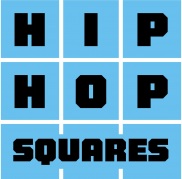 In the grand tradition of modernizing classic brands, MTV2 announced that they will revive the game show property Hollywood Squares with a 21st century spin. Hip Hop Squares will feature familiar names like DJ Khaled, Fat Joe, Mac Miller, Machine Gun Kelly, Ghostface Killah, Nick Cannon while throwing in the occasional associated panelist, including Pittsburgh Steelers linebacker LaMarr Woodley and Jackass/Wildboyz star Bam Margera. Speaking to EW, MTV2’s programming chief Paul Ricci the goal was to “refresh an iconic format and create a fun, dynamic series that’s unpredictable, heavy on personality and much more ‘party’ than ‘game show’.”
In the grand tradition of modernizing classic brands, MTV2 announced that they will revive the game show property Hollywood Squares with a 21st century spin. Hip Hop Squares will feature familiar names like DJ Khaled, Fat Joe, Mac Miller, Machine Gun Kelly, Ghostface Killah, Nick Cannon while throwing in the occasional associated panelist, including Pittsburgh Steelers linebacker LaMarr Woodley and Jackass/Wildboyz star Bam Margera. Speaking to EW, MTV2’s programming chief Paul Ricci the goal was to “refresh an iconic format and create a fun, dynamic series that’s unpredictable, heavy on personality and much more ‘party’ than ‘game show’.”
That line-up carries serious weight, but there’s a missing piece of the puzzle that helped the show’s previous incarnations become milestones. Based on the released hip hop-centric panelists, there’s a complete lack of diversity — specifically on the sexual-orientation front. That may not seem like a big deal, but for all of the game show brand’s kitsch and silliness, Hollywood Squares pushed the envelope; in 1968, the original version anchored the show with Paul Lynde, who, while never revealing his personal sexual preferences, but retroactively became a gay figurehead. In the 1998 revival, comedian Bruce Vilanch was a permanent fixture, routinely cracking innuendo jokes that spoofed his sexuality. There’s no written rule that Hollywood Squares needs a gay cast member to function or be properly executed, but it’s boldly hosted them with little audience resistance and always for entertainment-driven reasons.
The hip hop industry is notoriously narrow and there history with the gay community has rough patches. Currently, there aren’t openly gay rappers working with mainstream labels. But Hip Hop Squares panelist Fat Joe believes there are plenty working in the industry. In a 2011 interview, the rapper told VladTV that he believed there was a large gay community in the hip-hop world — but that they weren’t coming out. “I think I’ve done songs with gay rappers. I’m pretty sure of that … I happen to think there’s a gay mafia in hip-hop. Not rappers — editorial presidents of magazines, the PDs at radio stations, the people who give you awards at award shows … They’re in power … So why wouldn’t a guy come out and say, ‘Yo, I’m gay’ and get that type of love? ” Author Terrance Dean corroborates the idea in his 2008 book Hiding in Hip Hop: On the Down Low in the Entertainment Industry — from Music to Hollywood. Gay hip hop artists exist — and may even be stars — but the industry pressure doesn’t allow them to be open.
Even if gay artists aren’t prominent in the big labels, they are working, and thriving, in the US. MC Big Freedia is breaking out in New Orleans, helping expand the Sissy Bounce genre out of its regional confines (he appeared on Jimmy Kimmel Live! earlier this year), while Cazwell has gained notoriety through the True Color Tour and LOGO promotion — but you won’t find his music videos running in regular rotation on Viacom’s sister site MTV.
In a strange way, MTV2 has an opportunity with Hip Hop Squares. Bring in the audience that comes for Ghostface Killah, Nick Cannon and a handful of NFL stars then expose them to some wonderful gay talent. Based on the announced line-up, the show already sounds homogeneous. The rap world is dying for a breakout, an equality game changer that even the media seems unable to crack (The New York Times is profiling MC Big Freedia and yet few have heard of him). The new Hollywood Squares needs its Paul Lynde, its Bruce Vilanch, its diversity. And there are plenty of choices.
Thanks to @JenniMiller and @gmorse for additional research.
Find Matt Patches directly on Twitter @misterpatches and remember to follow @Hollywood_com!
[EW]


